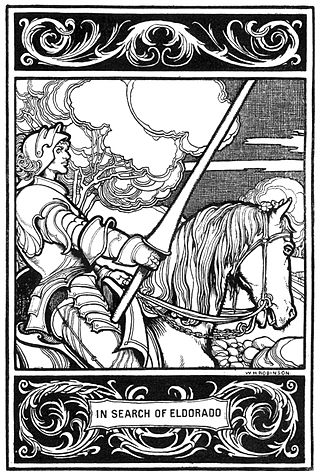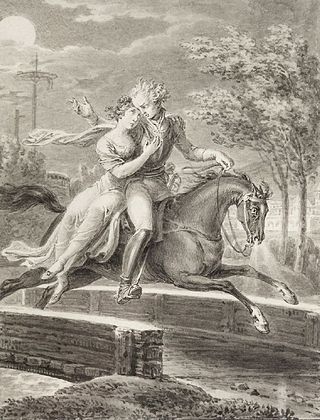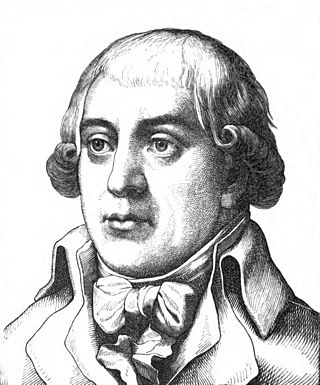See also
- Leonore (disambiguation)
- Lenora (disambiguation)
- Lenor, a fabric softener
- Eleanor (disambiguation)
Lenore may refer to:

"The Raven" is a narrative poem by American writer Edgar Allan Poe. First published in January 1845, the poem is often noted for its musicality, stylized language and supernatural atmosphere. It tells of a distraught lover who is paid a mysterious visit by a raven that seemingly can talk. The lover, often identified as a student, is lamenting the loss of his love, Lenore. Sitting on a bust of Pallas, the raven seems to further antagonize the protagonist with its constant repetition of the word "Nevermore". The poem makes use of folk, mythological, religious, and classical references.

Gottfried August Bürger was a German poet. His ballads were very popular in Germany. His most noted ballad, Lenore, found an audience beyond readers of the German language in an English and Russian adaptation and a French translation.

Joseph Joachim Raff was a German-Swiss composer, pedagogue and pianist.

"Annabel Lee" is the last complete poem composed by American author Edgar Allan Poe. Like many of Poe's poems, it explores the theme of the death of a beautiful woman. The narrator, who fell in love with Annabel Lee when they were young, has a love for her so strong that even angels are envious. He retains his love for her after her death. There has been debate over who, if anyone, was the inspiration for "Annabel Lee". Though many women have been suggested, Poe's wife Virginia Eliza Clemm Poe is one of the more credible candidates. Written in 1849, it was not published until shortly after Poe's death that same year.

"Lenore" is a poem by the American author Edgar Allan Poe. It began as a different poem, "A Paean", and was not published as "Lenore" until 1843.

"Ulalume" is a poem written by Edgar Allan Poe in 1847. Much like a few of Poe's other poems, "Ulalume" focuses on the narrator's loss of his beloved due to her death. Poe originally wrote the poem as an elocution piece and, as such, the poem is known for its focus on sound. Additionally, it makes many allusions, especially to mythology, and the identity of Ulalume herself, if a real person, has been a subject of debate.
Leonora or Leonara may refer to:

Edgar Allan Poe's poem "The Raven" has been frequently referenced and parodied in contemporary culture. Immediately popular after the poem's publication in 1845, it quickly became a cultural phenomenon. Some consider it the best poem ever written. As such, modern references to the poem continue to appear in popular culture.

"Eldorado" is a poem written by Edgar Allan Poe, first published in April 1849.
The Bells may refer to:

American poet and short story writer Edgar Allan Poe has had significant influence in television and film. Many are adaptations of Poe's work, others merely reference it.

"Eulalie", or "Eulalie — A Song", is a poem by Edgar Allan Poe, first published in the July 1845 issue of The American Review and reprinted shortly thereafter in the August 9, 1845 issue of the Broadway Journal.
This article lists all known poems by American author and critic Edgar Allan Poe, listed alphabetically with the date of their authorship in parentheses.

Edgar Allan Poe has appeared in popular culture as a character in books, comics, film, and other media. Besides his works, the legend of Poe himself has fascinated people for generations. His appearances in popular culture often envision him as a sort of "mad genius" or "tormented artist", exploiting his personal struggles. Many depictions of Poe interweave elements of his life with his works, in part due to Poe's frequent use of first-person narrators, suggesting an erroneous assumption that Poe and his characters are identical.
William Henry Leonard Poe, often referred to as Henry Poe, was an American sailor, amateur poet and the older brother of Edgar Allan Poe and Rosalie Poe.
Edgar Allan Poe (1809–1849) was an American writer.

"Lenore", sometimes translated as "Leonora", "Leonore", or "Ellenore", is a poem written by German author Gottfried August Bürger in 1773, and published in 1774 in the Göttinger Musenalmanach. "Lenore" is generally characterised as being part of the 18th-century Gothic ballads, and although the character that returns from its grave in the poem is not considered to be a vampire, the poem has been very influential on vampire literature. William Taylor, who published the first English translation of the ballad, would later claim that "no German poem has been so repeatedly translated into English as 'Ellenore'".

Symphony No. 5 in E major (Lenore), Op. 177, was composed by Joachim Raff between 1870 and 1872. It is generally regarded as his best symphony and the most frequently performed and recorded today. It was inspired by Gottfried August Bürger's ballad Lenore, set during the Seven Years' War.

The Fall of the House of Usher is an American gothic horror drama television miniseries created by Mike Flanagan. All eight episodes were released on Netflix on October 12, 2023, each directed by either Flanagan or Michael Fimognari, with the latter also acting as cinematographer for the entire series.

Rosalie Mackenzie Poe was an American poet and the sister of Edgar Allan Poe.